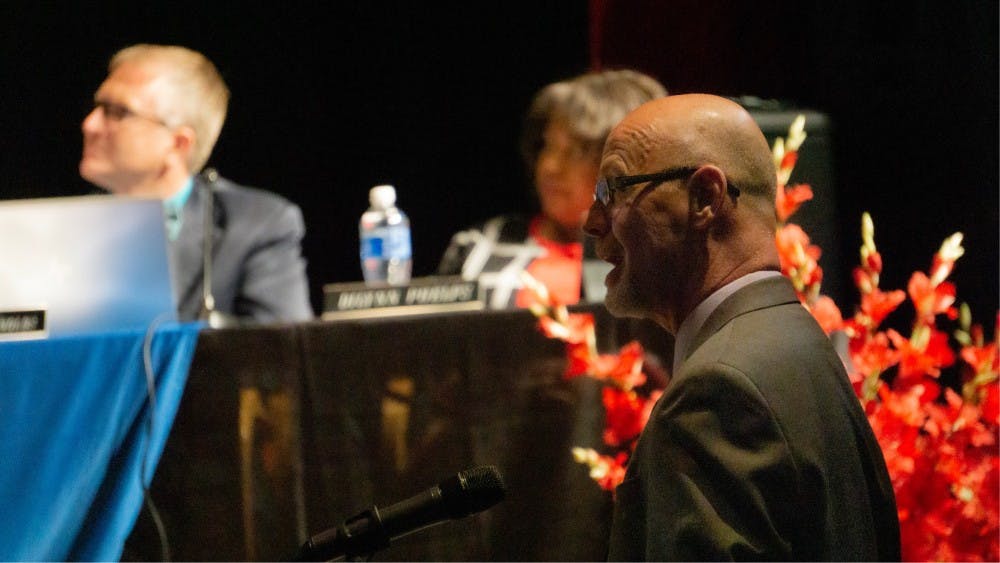Southside Middle School Principal Craig Standish, during his presentation on the school’s performance, reflected on the ways the school tackles issues related to tardiness at the Muncie Community Schools (MCS) Board meeting Tuesday at Southside’s auditorium.
Standish began his presentation speaking about the school’s enrollment. He said overall, despite losing 10 students over the school’s fall break, Southside was up around 30 students this school year.
Later during his presentation, the principal spoke about the school’s new policy of giving students who arrive late to school breakfast in the classroom.
“We noticed in the beginning of the school year that we had students coming in late due to really the MITS buses and things like that,” he said.
When the buses do run on schedule, Standish said some students come in around 8:53 a.m. a few minutes before the first bell rings for students to be in their classrooms at 9 a.m. Although the cafeteria remains open for late arrivals to get breakfast, he said they might be late to class by 15 to 20 minutes.
“Of course we wouldn’t count them late, but they were missing good class time,” he said, adding some students also picked up on this, intentionally missing a little bit of class time.
Now, students who come in at the regular time go to the cafeteria and eat breakfast if they wish, and anyone who comes in after 8:53 a.m. is handed out sacked breakfasts which they are allowed to take to their classes.
“It’s a little bit of an experiment,” he said. “That way, we can make sure everybody has the opportunity to eat a breakfast.”
Standish said he was unsure about the spike in numbers Oct. 1, adding a couple of MITS buses might have come in late that day.
He said he wanted to follow the numbers and will continue offering sacked breakfasts at the very least to make sure all students have a chance to have a breakfast.
“One of the motivators behind this, of course, was we didn’t want students hungry in class because that leads to poor academics. It leads to behavior issues and things like that,” he said.
He also spoke about the consequences for students being tardy. While the school has occurrences of tardiness under control, the consequences, he said, were causing “some headaches.”
Per semester, he said the students have 720 opportunities to enter a classroom. After their fourth tardy, and for every tardy after, the students receive a consequence.
“The man hours that it takes us to drag those and to roll out those consequences is astronomical. It really is,” he said. “My student assistant coordinator, among other folks — he spends about half his day with tardies.”
As an example, he said for all 200 students in the sixth grade with eight periods — 1,600 opportunities — 12 tardies in a day doesn’t reflect a bad day, but that adds up throughout the month.
The fourth tardy entails a written referral, a 30-minute warning detention and the school has to call the student’s parents to let them know, which Standish said was labor intensive.
The sixth tardy entails a one-hour detention, which puts students in Saturday school, for which only half the students show up. In a month, he said around 150 to 200 tardies were being reported.
Currently, the school policy counts a student as tardy if the student is not in the classroom when the school bell rings. Students who are more than two minutes late are counted as truant.
Despite the school bell system being down ever since a week before fall break, he said he noticed the students didn’t wait to hear the bell but continued attending their respective classes.
Jim Williams, MCS Board president, concurred with the opinion that the school shouldn’t be spending half the day with tardiness-related consequences. Standish said he would bring in a proposal soon regarding the consequences for tardiness.
In his presentation, he also highlighted programs to Southside — the three life skills classes which have 25 students from MCS and the Delaware-Blackford Special Education Cooperative, the emotional disabilities program, Indiana Career Explorer program and the Google Suites classes for seventh graders.
Other unique programs, he said, were the backpack program, in which around 250 students take home a backpack full of food every Friday, and the clothing den program, which has given out more than 60 winter coats in the past two days. For the rest of the presentation, he focused on other positives and challenges at the school.
Aside from Southside’s evaluation, the Board also heard several proposals from Muncie Central High School’s student-run advisory board, including the possibility of implementing a block schedule for classes — fewer classes for longer periods in a day.
Williams requested the student advisory board work out a cost estimate for switching to block scheduling.
Contact Amelia Cisna with comments at amcisna@bsu.edu or on Twitter @AmeliaCisna. Contact Rohith Rao with comments at rprao@bsu.edu or on Twitter @RaoReports.





